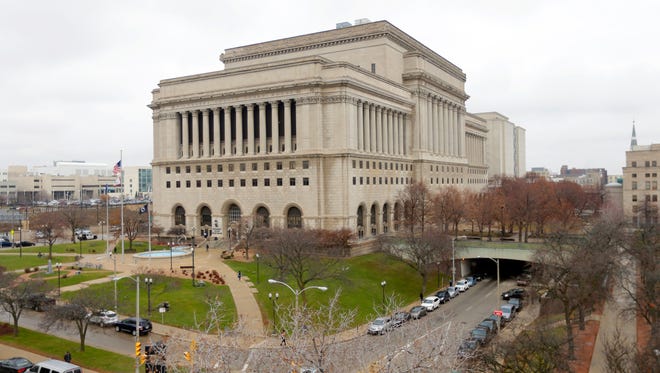County Board approves $30 wheel tax
Milwaukee County vehicle owners will begin paying an annual $30 wheel tax next year, as part of a $1.1 billion spending plan for 2017 approved Monday by the County Board.

The county property tax levy for 2017 will rise 1.43%, or $4 million, to $291.07 million, to help pay for county government next year. The total levy is $96,286 less than the amount included in County Executive Chris Abele's recommended 2017 budget, according to Steve Cady, research and policy director in the Comptroller's Office.
The tax rate needed to generate the levy falls slightly from around $5.12 per $1,000 of equalized value this year to $5.08 for 2017, Cady said. Other revenue sources include direct charges for services, a county sales tax, state aid, state shared revenue payments, federal grants, bond proceeds and grants from private sources.
On a 10-7 vote, the board approved a $30 vehicle registration fee ordinance during its annual budget adoption meeting.
Earlier in the meeting, the board on a vote of 17-1 approved a package of amendments to County Executive Chris Abele's recommended budget that uses revenue from a $30 wheel tax.
Supervisor John Weishan voted no.
"My constituents have told me loud and clear they don't want a wheel tax," Weishan said.
On the subsequent vote for the ordinance establishing the $30 fee, however, six additional supervisors joined Weishan in opposition even though they approved a spending plan dependent on its revenue. The other supervisors voting against the wheel tax include Deanna Alexander, Eddie Cullen, Michael Mayo Sr., Dan Sebring, Anthony Staskunas and Steve Taylor.
Weishan and those six supervisors also voted against adopting the 2017 budget as amended by the board.
No supervisors said they liked the new wheel tax.
"I'm basically against a tax increase," Supervisor James Schmitt said. "My constituents don't like this budget at all."
Schmitt said he accepted the fee as a compromise to support transportation without a massive spending spree.
In a statement, the county executive thanked the majority of supervisors for recognizing a vehicle registration fee "is the only available option for the county to continue to provide service and make investments in both our transportation infrastructure and crucial innovations like bus rapid transit."
In separate action, the board approved a budget amendment that changes the existing free bus fare GO Pass program for the disabled and residents 65 years and older. Beginning in 2017, a $5 fee will be charged for GO Pass applications, as recommended by Abele.
GO Pass users will pay a $1 fare beginning in 2018, under the amendment proposed by Supervisor Michael Mayo Sr. and approved by the board. Abele had recommended a 25-cent fare to start in 2017.
The $1 fare would yield $2.15 million in 2018, according to budget documents. The amendment approved by the board also establishes a panel next year comprised of county transportation officials and advocates for the disabled and elderly to implement income and other eligibility restrictions for the GO Pass.
The $30 county vehicle registration fee will generate nearly $13.5 million in 2017. Those funds would be divided with $11.5 million going to bus transit operating costs and $2 million to be spent on major transportation projects, including bus replacements, bridge and road repairs, and development of a bus rapid transit service between downtown Milwaukee and the Milwaukee Regional Medical Center in Wauwatosa.
The county vehicle registration fee will be paid in addition to the $75 fee collected by the state. City of Milwaukee vehicle owners also pay a $20 vehicle registration fee.
Abele had recommended a $60 fee to generate $27.1 million in 2017 for transit costs and transportation projects.
Comptroller Scott Manske advised the board that revenue from the larger $60 fee is needed. Even with a $60 fee starting in 2017, the revenue would not be sufficient to balance transit expenses in just a few years without increases in bus fares or route cuts.
By cutting the wheel tax in half, County Board Chairman Theodore Lipscomb Sr. and the board reduced revenue in the executive's budget by $13.6 million. To reduce spending by that amount, the board approved cuts that deleted or delayed road construction and other transportation projects.
Among the effects of the reduced spending package: slow development of the bus rapid transit service between by extending its completion until 2018; trim fleet vehicle purchases by the Sheriff's Office and Parks Department; and delay building a replacement highway maintenance shop on the north side of the county.
An advisory referendum question approved by the board Monday will ask voters in the April 4 election if they support a $60 registration fee per vehicle to help pay costs of transit services and transportation projects.